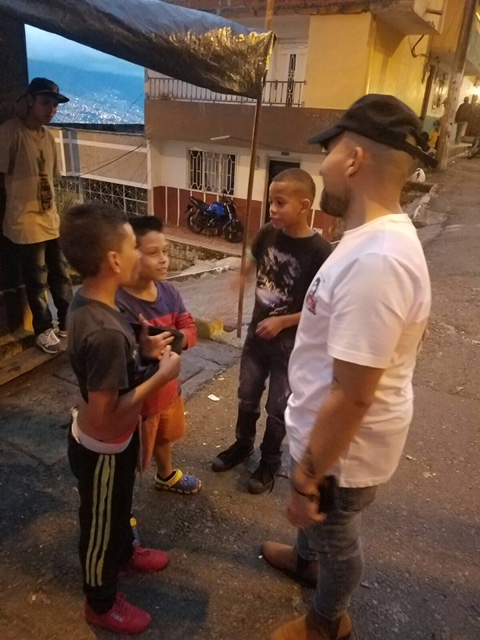Raul Arboleda / Getty
As the rising sun illuminates the streets of Medellín, shouts of se vende mangos serenade the neighborhood. As the vendor's voice echoes through the barrio, I reflect on a concern that has been heavy on my mind: long term investments. This city is best known for producing Pablo Escobar and his reign, especially since Narcos-fever hit last year. But the investment on my mind has nothing to do with bundles of cash in coke-dusted rubber bands. At 27, back in Colombia for the first time in years, I get to wondering about my own approach to happiness.
I stand there in the middle of one of Medellín's most popular barrios—Manrique Oriental—on a film set for a music video with one of the rap artists I work with. The aesthetics, vibes, and culture of the neighborhood was integral to production. The neighborhood has been nicknamed "Manrique Hollywood," due to the influx of foreigners that come to film their projects there—especially when they are looking for that gritty feel in a vibrant, tropical terrain.Weaving through the street vendors, with their green mangoes impossibly balanced on their rickety carts, I hear the shrill laughter of children. Las señoras from the neighborhood lounge in front of their houses midday, partaking in a session of chismes. The constant interaction I notice expresses a sense of community that I find vaguely unfamiliar. I feel as if I'm in a real-life Instagram post.One of the most famous lines from Gabriel Garcia Marquez (or Gabo, as we affectionately call him) is: "I am a poor man with money." That couldn't have been more relevant to describe my moment of realization.As usual, I'd been steeped in my "let's get this work done, get paid, and go home" mentality when I got to Medellín. This attitude, a hallmark of American culture (and my own Colombian-American identity) is a pretty obvious distortion of what actually makes humans happy and healthy. Take, for instance, Harvard's 75-year Happiness study, the longest study of adult life ever conducted. After interviewing generations of well-off white guys, they found the same thing I realized after like six minutes in Medellín: "Good relationships keep us happier and healthier."Those cheesy tees my aunt wears are actually accurate: Colombians do do it better.On my second day in Medellín, I met an 11-year-old boy named Angelo and his best friend Daniel, who was nine. Angelo was slowly riding a bike and Daniel was walking by his side; they couldn't seem to keep their eyes off me—my separateness from the other locals immediately marked me as an outsider. Eventually they approached me with curiosity and asked me who I was and what was I doing there. I clicked with these kids. We were vibing on the same frequency. They sparked memories of the traditional community values I was raised with, which emphasized tight relationships. It was all our parents knew. It was kind of all they had, too. When the first generation of kids grew older, our holidays, rituals, and values became more Americanized, in an attempt to assimilate. The values taught by our parents slowly diminished and we grew apart.Deborah Serani, a psychologist and professor of psychology at Adelphi University, linked my nostalgia while in Medellín to environments that provide feelings of safety and security. According to Serani, those very feelings foster social bonds, love bonds, and a sense of community. "The bigger a country gets, the more disconnected people get from their neighbors and their community, then the less happiness and the less security they have," she says.In a TED Talk about the Harvard Happiness study, Captain Obvious, a.k.a. Robert Waldinger—the fourth director of the research (75 years, people)—says that while fame and wealth were priorities for my his participants, their successful relationships were what ultimately made their lives worthwhile. One thing he discussed did stand out though: That simply being with people didn't automatically free them from loneliness (which, in his talk, he deemed toxic). It's the intimacy and the quality of the bond that matters.As I Snapchatted my way through Medellín that week, I wondered which relationships I was unconsciously putting a filter on to look more fulfilling than it is, and which were genuine enough to stick until I was 90. Fucking Harvard probably has the funding to keep the study going until then.It was clear there that a sense of community was at the root of the palpable happiness felt by Angelo, Daniel, and many other inhabitants of Manrique Oriental. Everyone in the tight-knit neighborhood plays a role that contributes to the larger group. When productions or other big projects take place in the neighborhood, everyone commits to their duties, and everyone is compensated for their work—as a team. I'm sure there's more to what I saw during the week I was there, as far as those who go uncompensated, but what I did sees blew me away.We've seen tons of research on the physical and mental benefits of eating together as a family and during my visit, we all ate as a family. To me, food and relationships go hand in hand. A sancocho de calle—a traditional stew throughout Latin America made with chicken, potatoes, yuca, plantains and other veggies—was cooked on the street and fed 60 people within the neighborhood one evening while I visited. As I conversed with the chef responsible for the sancocho, he expressed frustrations as he prepped the avocados.The chef's concern epitomized a key factor in happiness, community relationships—he cares and wants what is best for the children in his community. "The children in the barrio are intelligent and wise," he told me, "but they are offered very limited opportunities, and that's where we lose them." The children seemed happy, though, and I wondered if these 'opportunities' the chef spoke of really mattered in the long run. I don't buy the "look at these simple, poor, happy people in developing countries" fetish, but I did wonder if growing up Colombian linked these kids to a more fundamental definition of success. Did they need opportunities in the traditional sense if their happiness was so in tact?Michelle Gielan, a positive psychology researcher, says that "90 percent of our happiness is a mix of your genes and how you process the world." Gielan asserts in her research that optimism is a key role in being happy. Finding beauty in all circumstances leads to an overall rich state of life, she says. I began to see how Medellín's standards of beauty might be different from mine and wondered if I could shift my perspective since, technically, that city is in my genes.Angelo and Daniel tell me how they are going to play professional soccer for Atletico Nacional when they grow up. I wondered if they thought about what it would mean to leave the barrio. Their happiness is produced by strong community, optimism, and their seemingly complete lack of experience with loneliness. Back in New York, scrolling through images of them, I wondered if I should just drop everything and move to Medellín, in true whimsical millennial fashion. I let that idea go real quick. It might be easier to just make some sancocho for my neighbors, instead.
I clicked with these kids. We were vibing on the same frequency. They sparked memories of the traditional community values I was raised with, which emphasized tight relationships. It was all our parents knew. It was kind of all they had, too. When the first generation of kids grew older, our holidays, rituals, and values became more Americanized, in an attempt to assimilate. The values taught by our parents slowly diminished and we grew apart.Deborah Serani, a psychologist and professor of psychology at Adelphi University, linked my nostalgia while in Medellín to environments that provide feelings of safety and security. According to Serani, those very feelings foster social bonds, love bonds, and a sense of community. "The bigger a country gets, the more disconnected people get from their neighbors and their community, then the less happiness and the less security they have," she says.In a TED Talk about the Harvard Happiness study, Captain Obvious, a.k.a. Robert Waldinger—the fourth director of the research (75 years, people)—says that while fame and wealth were priorities for my his participants, their successful relationships were what ultimately made their lives worthwhile. One thing he discussed did stand out though: That simply being with people didn't automatically free them from loneliness (which, in his talk, he deemed toxic). It's the intimacy and the quality of the bond that matters.As I Snapchatted my way through Medellín that week, I wondered which relationships I was unconsciously putting a filter on to look more fulfilling than it is, and which were genuine enough to stick until I was 90. Fucking Harvard probably has the funding to keep the study going until then.It was clear there that a sense of community was at the root of the palpable happiness felt by Angelo, Daniel, and many other inhabitants of Manrique Oriental. Everyone in the tight-knit neighborhood plays a role that contributes to the larger group. When productions or other big projects take place in the neighborhood, everyone commits to their duties, and everyone is compensated for their work—as a team. I'm sure there's more to what I saw during the week I was there, as far as those who go uncompensated, but what I did sees blew me away.We've seen tons of research on the physical and mental benefits of eating together as a family and during my visit, we all ate as a family. To me, food and relationships go hand in hand. A sancocho de calle—a traditional stew throughout Latin America made with chicken, potatoes, yuca, plantains and other veggies—was cooked on the street and fed 60 people within the neighborhood one evening while I visited. As I conversed with the chef responsible for the sancocho, he expressed frustrations as he prepped the avocados.The chef's concern epitomized a key factor in happiness, community relationships—he cares and wants what is best for the children in his community. "The children in the barrio are intelligent and wise," he told me, "but they are offered very limited opportunities, and that's where we lose them." The children seemed happy, though, and I wondered if these 'opportunities' the chef spoke of really mattered in the long run. I don't buy the "look at these simple, poor, happy people in developing countries" fetish, but I did wonder if growing up Colombian linked these kids to a more fundamental definition of success. Did they need opportunities in the traditional sense if their happiness was so in tact?Michelle Gielan, a positive psychology researcher, says that "90 percent of our happiness is a mix of your genes and how you process the world." Gielan asserts in her research that optimism is a key role in being happy. Finding beauty in all circumstances leads to an overall rich state of life, she says. I began to see how Medellín's standards of beauty might be different from mine and wondered if I could shift my perspective since, technically, that city is in my genes.Angelo and Daniel tell me how they are going to play professional soccer for Atletico Nacional when they grow up. I wondered if they thought about what it would mean to leave the barrio. Their happiness is produced by strong community, optimism, and their seemingly complete lack of experience with loneliness. Back in New York, scrolling through images of them, I wondered if I should just drop everything and move to Medellín, in true whimsical millennial fashion. I let that idea go real quick. It might be easier to just make some sancocho for my neighbors, instead.
Advertisement
Advertisement

Advertisement
